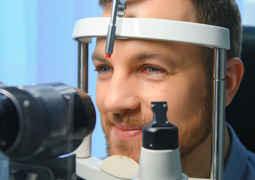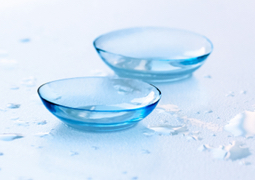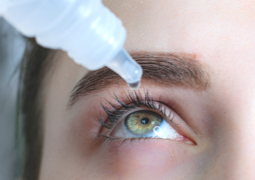Have you ever noticed little specks, strings, or cobwebs drifting through your line of sight? These are often called eye floaters, and it’s common to wonder what causes them—especially if you’re also dealing with the discomfort of dry, irritated eyes.
You might be curious if there’s a connection between that gritty, dry feeling and the floaters you see. While dry eyes don’t directly cause new floaters, the discomfort and inflammation caused by dry eye disease can make you much more aware of the floaters you already have.
First, What Are Eye Floaters?
When you see floaters, you’re not looking at something on the surface of your eye. These tiny shapes are actually shadows cast on your retina, the light-sensitive tissue at the back of your eye. They come from small clumps of protein or cells inside the vitreous, the clear, gel-like substance that fills your eyeball.
Because floaters are suspended in this gel, they drift and move as your eyes move. This is why they seem to dart away when you try to look directly at them. Most of the time, floaters and spots are a normal part of the eye’s natural changes over time.
What Can Trigger Eye Floaters?
Floaters become more common as we get older. The vitreous humour in our eyes naturally liquefies and contracts over time, which can cause small fibres to clump together and become more visible. Other factors can combine to make you more or less aware of these imperfections.
Can Dry Eyes Make You See Floaters?
There isn’t a direct link showing that dry eye syndrome creates floaters. However, there is a relationship between the two. When your eyes are dry, they can become irritated, red, and uncomfortable.
This constant irritation can draw your attention to your vision in a more focused way. As a result, you may become more conscious of floaters that have been there all along. Soothing your dry eye symptoms can often make these floaters seem less bothersome.
Are Floaters Caused by Dehydration?
Your body’s hydration levels can influence your eye health. The vitreous in your eye is made up of about 99% water. However, there’s no real evidence that dehydration itself causes floaters.
Can Too Much Screen Time Cause Eye Floaters?
Staring at a computer or phone for hours doesn’t create new floaters. It can, however, lead to digital eye strain and dry eyes because we tend to blink less often. This discomfort can make you more sensitive to visual distractions—including floaters against a bright screen.
How to Get Relief from Eye Discomfort
Managing general eye irritation is a good first step toward feeling better. When your eyes are comfortable and well-lubricated, you may find that floaters are less of a distraction. Simple care can go a long way in improving how your eyes feel day to day.
Do Lubricating Eye Drops Help?
Using artificial tears or lubricating eye drops can provide immediate relief for dry eye symptoms. By restoring moisture to the surface of your eye, eye drops can reduce feelings of grittiness and irritation. When your eyes feel better, you may notice floaters less frequently.
Simple At-Home Comfort Measures
A few easy habits can help soothe tired or irritated eyes. These simple steps can be integrated into your daily routine to promote eye comfort.
- Use a cool compress to reduce discomfort.
- Stay hydrated throughout the day.
- Take regular breaks from digital screens, like following the 20-20-20 rule.
- Get plenty of sleep to let your eyes rest.

Signs You Should Have Your Eyes Checked
While most floaters are harmless, certain signs can point to a more serious issue. A sudden change in your vision is always a good reason to seek emergency eye care.
Pay attention to any of the following symptoms:
- A sudden increase in the number of floaters
- Flashes of light in your vision
- A shadow or curtain in your peripheral vision
- Sudden eye pain
These symptoms could indicate a more serious condition, like retinal detachment, which requires immediate attention from an eye doctor.
Proactive Steps for Your Eye Health
Maintaining the health of your eyes involves simple and consistent habits. Taking a proactive approach can help support your vision for years to come. It’s about building a routine that puts your eye wellness first.
Regular comprehensive eye exams with your family eye doctor in Calgary are a key part of this approach. We can track any changes in your vision and provide guidance tailored to your needs.
You can also support your long-term eye health with these tips:
- Eat a balanced diet with foods that support vision.
- Wear sunglasses to protect your eyes from UV rays.
- Avoid rubbing your eyes to prevent irritation.
Taking care of your eyes is an important part of your overall wellness. If you have concerns about floaters, dry eyes, or any changes in your vision, our team at Calgary Family Eye Doctors is here to help. Schedule a visit with us today to get the answers and support you need.




























